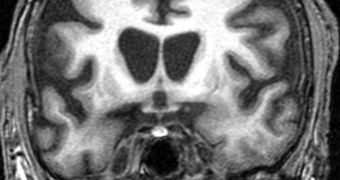University of Melbourne scientists, in Australia, say that excessive iron concentrations in the human brain may represent one of the main causes of neurodegenerative forms of dementia, such as Alzheimer's and Parkinson's diseases. This study is critical because the conditions are incurable.
The thing about these forms of dementia is that they develop without showing any symptoms for periods of time spanning up to decades. Medical imaging techniques can only discover their telltale signs after the diseases are already set in, or after visible symptoms start to show.
What scientists failed to discover until now was a clear trigger for these conditions. They know that mental activities – such as those involving the use of superior cognitive capabilities – can avert the development of Alzheimer's, for instance, but why this protective effect occurs is unknown.
The Australian investigation basically provides one of the first real clues as to the origins of dementia. Researchers say that they were able to verify the theory by using mice that were genetically modified to develop Alzheimer's and Parkinson's.
In order to see whether their assumptions about the role of iron were justified or not, the team administered an iron chelator, a substance meant to decrease this chemical's concentrations in the brain. The UM team reports that mice treated with the chemical did not go on to develop dementia.
“Treating a tau [knock-out] KO mouse with an iron chelator was not an experiment you would have predicted to be obvious from the existing literature. We were quite stunned by how profoundly clioquinol [the iron chelator] rescued the tau KO mice,” UM team leader Ashley Bush explains.
The expert goes on to say that the tau protein tangles everyone blames for the development of neurodegenerative, incurable dementias are not the sole triggers involved in allowing these conditions to develop until they kill.
“Genetic studies have implicated tau in both Alzheimer's and Parkinson's, but there is no certainty about what goes wrong,” Bush explains. She adds that portions of brain tissue affected by dementia exhibit lower levels of soluble tau proteins, but increased iron concentrations.
The study revealed that smaller amounts of soluble tau prevented the circulation of a protein involved in exporting iron out of nerve cells. This discovery indicates another avenue for research in developing novel therapeutic approaches against dementias, Chemistry World reports.
“This paper suggests that complete loss of tau can also lead to neurodegeneration, and it is of great interest that iron is involved in this process as there are a number of rare forms of Parkinsonism that are linked to brain iron accumulation,” University College London neurodegenerative diseases expert Patrick Lewis explains.
“Therapeutic approaches that are being developed that target all forms of tau, such as immunotherapies or production inhibitors, could cause more damage than good,” the expert concludes.

 14 DAY TRIAL //
14 DAY TRIAL //